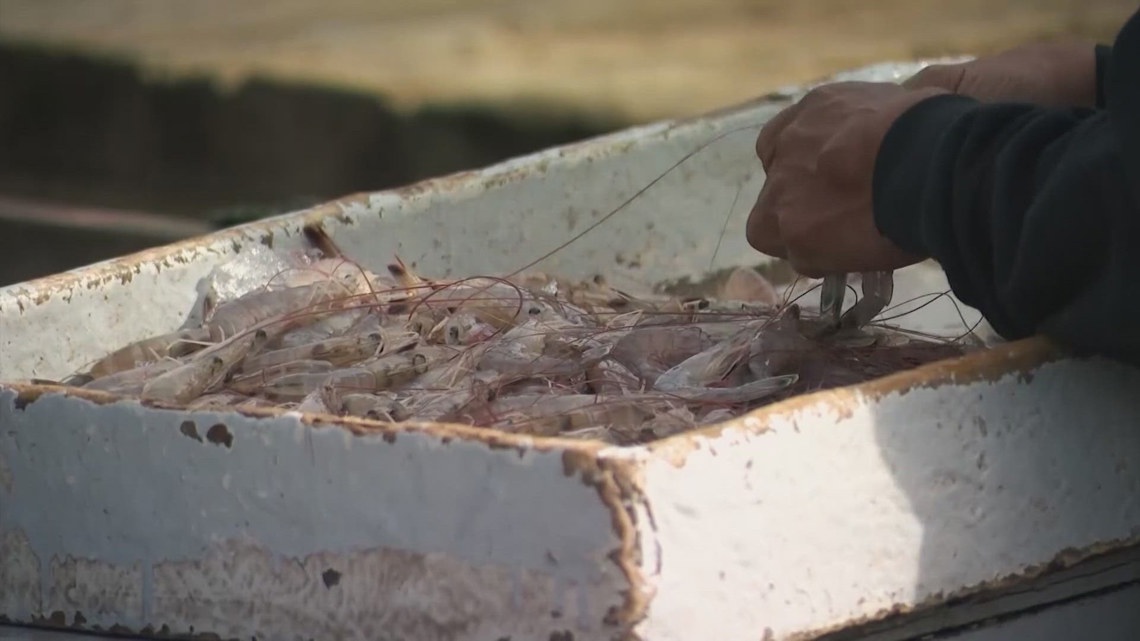
Dozens of randomly-selected restaurants were tested.
GALVESTON, Texas — When you go to a seafood restaurant in Galveston you might think you’re eating Gulf shrimp. You’re probably not.
Researchers contracted to test the shrimp served at restaurants in Galveston and Kemah found what customers are eating is more likely to be imported from outside of the country than caught in the Gulf of Mexico.
SeaD Consulting, the company that performed DNA tests on the shrimp served at 44 randomly selected restaurants is calling its findings a case of massive consumer fraud.
Galveston’s shrimping industry has been sinking for years.
Shrimpers say the competition from cheaper, farm-raised imported shrimp has driven down the price per pound of Gulf shrimp so much, they are losing money each time they put gas in their boats.
“There used to be 300 boats in Galveston, now there’s seven or eight,” says Nikki Johnson-Kunz. “It’s sad. It’s just really sad.”
Nikki Johnson-Kunz, also known as the “Shrimp Diva,” married into a family of Galveston shrimpers that has made a living fishing the waters of the Gulf for generations.
She was not surprised to learn the investigation’s test results revealed that nearly 60% of the restaurants were serving shrimp that had been imported and raised on farms abroad.
“It wasn’t shocking,” she said. “The restaurants that failed, I hope that they come around and to start doing what’s right; not lying to their customers.”
Dave Williams is a commercial fishery scientist and the founder of SeaD Consulting, the Houston-based company that developed a DNA testing process it says can determine a shrimp’s origin whether it is raw or cooked.
Williams says it is not easy to determine a shrimp sample’s origin based on looks alone.
“Looking from the outside, you can’t really see any difference,” Williams said. “If you just saw a dish with one or the other items, you wouldn’t be able to identify which one is which.”
SeaD consulting was contracted by the Southern Shrimp Alliance to investigate randomly selected restaurants in Galveston and Kemah that claimed or implied they served wild-caught Gulf shrimp.
“Fifty-nine percent of the restaurants serving shrimp were serving imported farm-raised shrimp,” Williams said. “Of those, approximately half of them said they were Gulf shrimp which they weren’t.”
Williams says the remaining restaurants implied they were serving wild-caught Gulf shrimp through their marketing.
The Federal Trade Commission is the authority tasked with enforcing incidents of consumer fraud.
The agency declined our request for an interview, however, the FTC warns restaurants on its website that they may be committing fraud even by the decorations in their dining rooms, like fishing nets and boats, implying the seafood served is locally caught.
“It’s kind of a bait-and-switch,” says BLVD Seafood executive chef Chris Lopez. “I don’t think it’s fair.”
BLVD Seafood is among the little more than a dozen restaurants tested by SeaD that turned out to actually be serving wild-caught Gulf shrimp.
“If you’re a tourist, you want a product that comes out of these waters, you don’t want something from somewhere else,” Chef Lopez said.
Instead of naming the restaurants that didn’t pass the test, Dave Williams says his company will be sending them letters first. He is hopeful they’ll make the changes on their own, for the sake of their customers, and for the sake of the Texas shrimpers.
